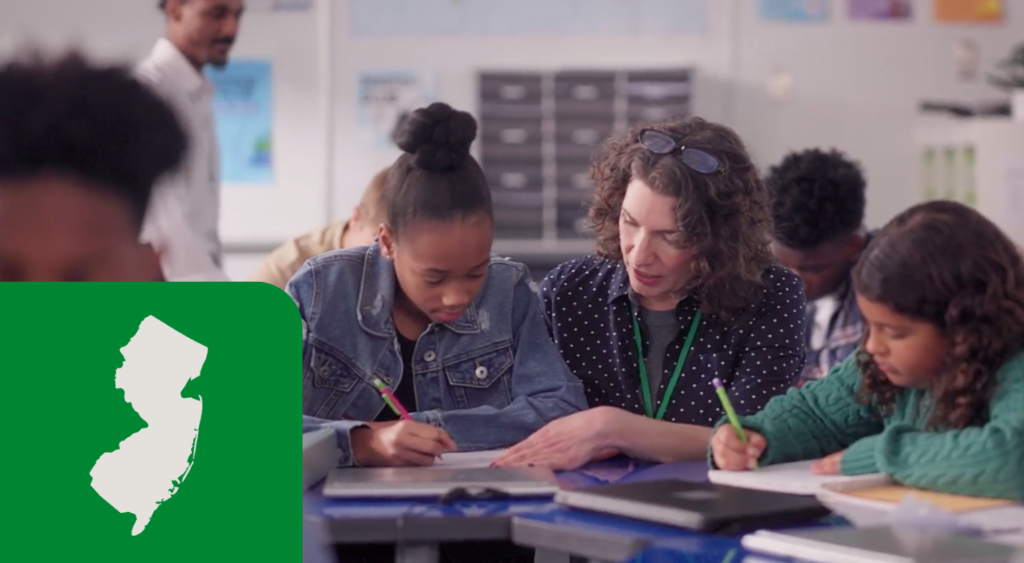How to become a paraprofessional in NJ.

To become a paraprofessional in New Jersey, there are several requirements you need to meet to land this important role in our schools.
Minimum New Jersey state paraprofessional requirements, at a glance:
- High school diploma or equivalent
- Some districts may require additional college credits
- Background check and fingerprinting
- Health clearance
- Employment verification
In addition to New Jersey state requirements, Kelly Education requires:
- Pre-hire training
- New hire orientation
Kelly Education is the nation’s leading provider of educators in schools. We refer to our paraprofessionals as paraeducators because like paramedic or paralegal) it reflects the professionalism that aligns with the field. Local school districts may call them parapros or teachers’ aides as well.
A deeper dive into paraeducator requirements.
Kelly Education works with schools across New Jersey to place paraeducators, so we know what it takes to get started. While the state doesn’t have a long list of requirements, the process can still take a little time, usually a few days to a few weeks.
How quickly things move depends on how soon you complete each step. Background checks and fingerprinting, in particular, can slow things down, so it’s helpful to get those going early.
Education requirements and verification.
In most cases, you’ll need to have a high school diploma or GED to be considered for a paraprofessional position in NJ. Some districts may require that you have an associate or bachelor’s degree to become a paraprofessional in NJ.
The school district will likely require a copy of your high school diploma or transcripts as proof that you meet the educational requirements for the position. If you have higher education credits, it’s a great idea to provide your college transcripts as well. There may be a small fee to to have those sent. If working with Kelly Education, we’ll help to point you in the right direction.
Experience.
While there isn’t a state requirement for experience to be considered for a paraprofessional position in NJ, there are some types of experience that may make you more likely to get hired.
Working with children, strong organizational skills, effective communication skills, and the ability to work collaboratively can all demonstrate that you’re likely to succeed in the classroom as a paraprofessional.
Certification, licensing, authorization, and permits.
To begin work as a paraprofessional in some New Jersey school districts, you’ll need to take the ETS ParaPro Assessment and pass with a score of 456 or higher. Your paraprofessional education program will prepare you to succeed on your assessment. While some districts don’t require ParaPro, studying for and passing the exam can help bolster your resume and prepare you to succeed in the classroom.
New Jersey also offers a Bilingual Paraprofessional Credential, which can help you make a difference in the lives of students who are speakers of languages other than English. When exploring how to become a general paraprofessional in NJ, you don’t need to hold a certification.
Background screening and fingerprinting.
You’ll need to pass a background check and fingerprinting before securing a position with a New Jersey school district. There may be a fee for that as well.
Health screenings.
In many cases, you’ll need to have proof of a negative tuberculosis (TB) test before you’ll be permitted to work in schools. You may also need to have a physical before your employment can begin.
Training.
Per the Individuals with Disabilities Education Act (IDEA), a federal law, paraprofessionals must receive appropriate training if they work with students who have special needs.
Training requirements to work as a paraprofessional can vary from one district to the next in New Jersey. Your school district will typically provide you with training during your orientation. It’s also a good idea to get a CPR and first aid certification (many school districts require these certifications and cover your costs, but otherwise, it will cost around $50).
Paraprofessional candidates interested in working with Kelly Education are required to complete ParaSmarts, which outlines best practices and role-specific duties. Once hired, our paraeducators also complete a one-hour, online new hire program that covers Kelly Education policies and information about the school district where you’ll be working.
Employment verification.
Before starting your work as a paraprofessional, you must prove eligibility to work in the United States. To complete this step, you’ll submit an I-9 form with valid identification credentials. This form can be completed in just a few minutes. Again, if you work with Kelly Education, our team will help you with this. If working for a district, you’ll typically work on this with the human resources team.
Become a substitute paraprofessional with Kelly Education.
If you’re ready to get started with a career that’s flexible and allows you to make a difference, we want to talk to you. If you or someone you know is interested in paraprofessional or substitute teaching jobs, fill out our brief interest form, and one of our recruiters will contact you to answer your questions.
We also have an entire library of helpful articles for paraprofessionals and school educators. They include:
- What is a paraprofessional in schools
- Understanding IEP and 504 plans
- Paraeducator job description, duties, and responsibilities
*Information subject to change. This is a general guideline as of July 2025. School districts may have additional requirements in addition to state requirements.
View Related: Applying for jobs Article Job searching
You might like
Find your next job
Discover thousands of temporary, full-time, and remote jobs for beginning and experienced job seekers.



